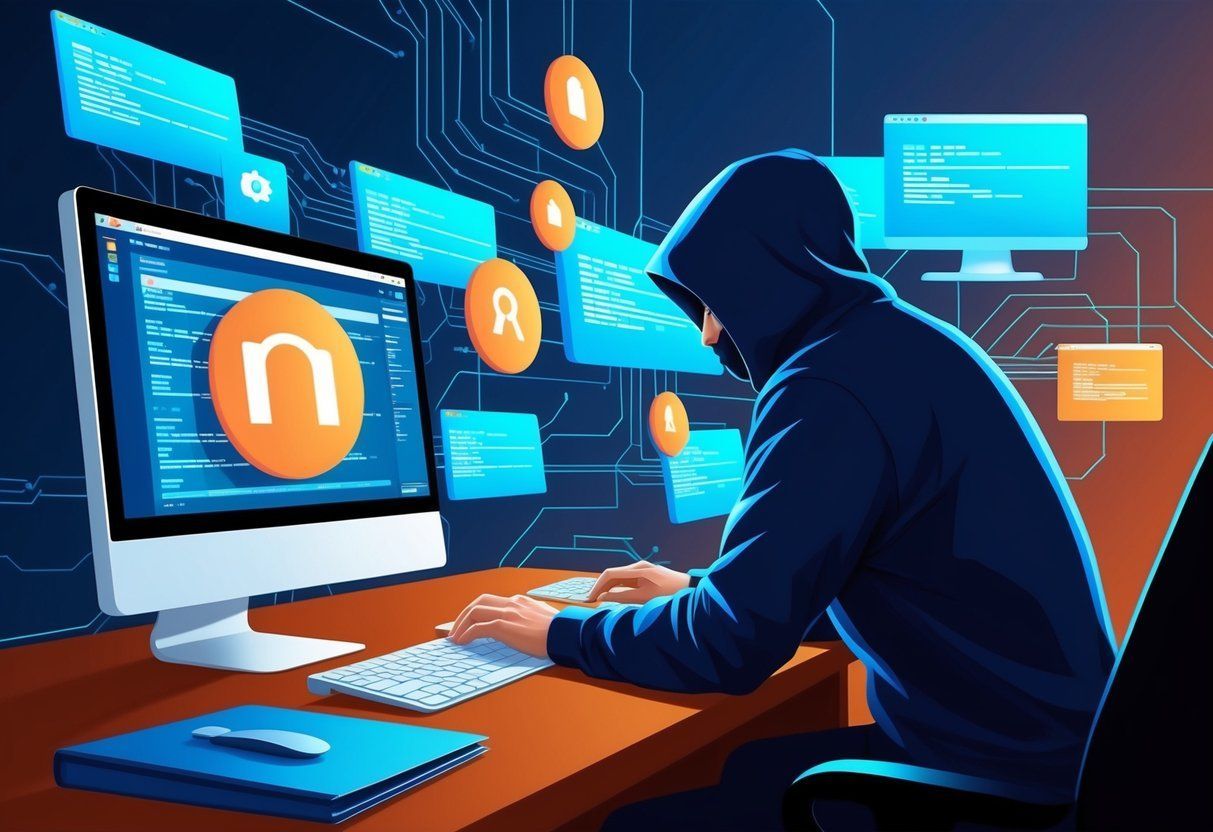FBI Is Hunting North Korean Hackers Who Attacked U.S. Healthcare System: Cybersecurity Crisis Intensifies
A recent cybersecurity crisis has thrust North Korean hackers into the spotlight. The FBI is actively pursuing these digital culprits who launched a series of attacks on the U.S. healthcare system.
North Korean military intelligence operatives have been indicted for hacking into American hospitals, NASA, and military bases , stealing sensitive information and deploying ransomware to fund further attacks.

The U.S. Justice Department announced the indictment of an alleged North Korean government-backed hacker for participating in a scheme to infiltrate U.S. hospital computer systems. This development highlights the growing threat of state-sponsored cyberattacks and their potential impact on critical infrastructure.
These attacks not only compromise patient data but also pose significant risks to national security.
The FBI’s pursuit of these hackers underscores the seriousness of the situation and the need for enhanced cybersecurity measures across all sectors.
Key Takeaways
- North Korean hackers have targeted U.S. healthcare providers, military bases, and government entities with ransomware attacks
- The FBI and Justice Department are actively pursuing and indicting individuals involved in these state-sponsored cybercrimes
- Enhanced cybersecurity measures are crucial to protect critical infrastructure from future attacks
Understanding The Threat

North Korean hackers pose a significant danger to U.S. healthcare systems and national security. Their sophisticated cyber capabilities and state-sponsored backing make them a formidable adversary requiring focused attention from law enforcement and intelligence agencies.
Profile of North Korean Cyber Forces
North Korea’s cyber forces operate under the Reconnaissance General Bureau , the country’s primary intelligence agency.
These hackers are highly trained and well-resourced, often recruited from top universities. They specialize in various cyber operations, including espionage, sabotage, and financial crimes.
The hackers typically work in teams, each focusing on specific targets or techniques.
Their arsenal includes custom-built malware, sophisticated phishing campaigns, and advanced persistent threats (APTs).
North Korean cyber units have demonstrated the ability to exploit zero-day vulnerabilities and evade detection by constantly evolving their tactics.
These state-sponsored actors often masquerade as legitimate entities or use false-flag operations to misdirect attribution efforts.
Their primary objectives include gathering intelligence, stealing funds to circumvent sanctions, and causing disruption to adversary nations.
Significance of the FBI’s Involvement
The FBI’s active pursuit of North Korean hackers underscores the severity of the threat. The Bureau’s involvement brings substantial resources and expertise to the investigation, increasing the chances of identifying and potentially apprehending the perpetrators.
FBI efforts include issuing arrest warrants and offering rewards for information leading to arrests.
This approach aims to disrupt the hackers’ operations and deter future attacks.
The FBI’s cyber division collaborates with international partners to track the hackers’ digital footprints across borders.
By leading the investigation, the FBI can coordinate responses across multiple affected sectors, ensuring a cohesive strategy against the North Korean cyber threat.
This centralized approach enhances information sharing and improves the overall defensive posture of U.S. critical infrastructure.
Impact on U.S. National Security
North Korean cyber espionage activities targeting U.S. healthcare and defense sectors pose a severe threat to national security.
The theft of classified military secrets could compromise strategic advantages and operational security.
Attacks on healthcare systems endanger patient data and potentially disrupt critical medical services.
This vulnerability could be exploited during times of crisis, amplifying the impact of other hostile actions.
The targeting of defense contractors and military installations suggests attempts to gain insights into U.S. military capabilities, including radar systems and weapon technologies.
Such information could be used to develop countermeasures or enhance North Korea’s own military programs.
Cyber attacks also serve as a asymmetric warfare tool, allowing North Korea to project power and influence beyond its conventional military capabilities.
This dynamic complicates diplomatic efforts and threatens regional stability.
The Attack on Healthcare

North Korean hackers launched a series of devastating ransomware attacks on U.S. healthcare systems, causing widespread disruption and endangering patient care.
The attacks targeted hospitals and health providers, locking up critical medical records and systems.
Ransomware as a Weapon
The hackers deployed sophisticated ransomware to encrypt hospital data and systems, demanding payment for decryption keys.
This malicious software locked medical staff out of patient records, billing systems, and critical equipment.
In one case, attackers demanded 2 Bitcoins (approximately $90,000) to unlock compromised systems.
The ransomware attacks served a dual purpose:
- Extorting money from healthcare providers
- Disrupting U.S. healthcare infrastructure
By targeting essential services, the hackers aimed to maximize pressure on victims to pay quickly. This tactic endangered patient care and exploited the critical nature of hospital operations.
Targeting Hospitals
U.S. hospitals and health care providers were specifically targeted in 2021 and 2022.
The attacks affected multiple facilities, including hospitals in Florida. Hackers infiltrated computer networks, installing malware to encrypt data and disrupt services.
The attacks caused significant disruptions:
- Locked medical records
- Disabled critical equipment
- Delayed patient care
- Compromised sensitive health information
Healthcare facilities were chosen as targets due to their reliance on digital systems and the urgent need for constant access to patient data. This made them particularly vulnerable to ransomware attacks and more likely to pay to quickly restore services.
Tracing the Attack

The FBI has launched a complex investigation to track down North Korean hackers who targeted U.S. healthcare systems.
Their efforts focus on reconstructing the digital trail left by the attackers and identifying the specific malware used in the breaches.
Reconstructing the Cyber Trail
Cybersecurity experts are meticulously analyzing log files and network traffic data to piece together the hackers’ movements. They’re examining:
- IP addresses and domains used by the attackers
- Timestamps of suspicious activities
- Patterns in data exfiltration attempts
This digital forensics work helps investigators understand the hackers’ methods and potentially link these attacks to known North Korean cyber operations.
The FBI is collaborating with international partners to trace the origin of the attacks.
They’re also working closely with affected healthcare providers to gather additional evidence and strengthen defenses against future intrusions.
Identifying the Malicious Software
A critical part of the investigation involves analyzing the malware used in the attacks.
Cybersecurity teams are:
- Reverse-engineering the malicious code
- Identifying unique signatures or behaviors
- Comparing findings with known North Korean malware samples
This analysis has revealed a new strain of ransomware targeting healthcare systems. Experts believe it’s an evolution of previously identified North Korean malware families.
The FBI has issued a cybersecurity advisory detailing indicators of compromise and recommended mitigation strategies. This information helps other organizations protect their networks from similar attacks.
International Ramifications

The North Korean hacking attacks on U.S. healthcare systems have far-reaching consequences beyond American borders. These cybercrimes affect global relations and reshape the international cybersecurity landscape.
Role of China and Russia
China and Russia play pivotal roles in the North Korean hacking saga. China, despite its friendly relations with North Korea , has not been spared from these attacks. An energy company in China fell victim to North Korean hackers, highlighting the indiscriminate nature of their operations.
Russia’s stance remains ambiguous. While not directly implicated, Russia’s historical ties with North Korea raise questions about potential collaboration or tacit support for these cyber activities.
The United States State Department has intensified diplomatic efforts to address this issue. They are pressuring both China and Russia to take decisive action against North Korean cyber threats.
Impact on Global Cybersecurity
The North Korean hacking campaign has significantly altered the global cybersecurity landscape.
South Korea and Taiwan, both targets of these attacks , have bolstered their cyber defenses in response.
Japan, another key player in the region, has increased collaboration with the United States to counter these threats.
The National Cyber Security Centre in various countries has issued alerts and guidelines to protect critical infrastructure.
These attacks have prompted international cooperation. The FBI is working with global partners to track and thwart North Korean hacking groups. This collaboration extends beyond government agencies to include private sector cybersecurity firms.
The global community now recognizes the need for a unified approach to cybersecurity. This shift may lead to new international agreements and standards for cyber defense and response protocols.
Economic Implications
North Korean hackers targeting U.S. healthcare systems have significant economic ramifications. Their activities intersect with cryptocurrency, sanctions evasion, and financial disruption of critical infrastructure.
Cryptocurrency and Sanctions Evasion
North Korean hackers leverage cryptocurrency to evade international sanctions.
They use ransomware attacks on healthcare facilities to extort payments in Bitcoin and other virtual currencies. These digital assets are then laundered through complex networks of wallets and exchanges.
The decentralized nature of cryptocurrencies makes them attractive for sanctions evasion.
North Korea uses these funds to finance further cyber operations and potentially support its nuclear program.
Law enforcement faces challenges in tracking and seizing these illicit funds. However, recent successes include the U.S. Department of Justice’s seizure of $500,000 worth of Bitcoin from suspected North Korean hackers.
Economic Targets and Financial Impact
U.S. healthcare entities face severe financial consequences from these attacks. Ransomware can disrupt operations, leading to lost revenue and expensive recovery efforts.
Hospitals may pay ransoms to quickly restore critical services, inadvertently funding further attacks. The financial impact extends beyond direct losses, including:
- Costs of cybersecurity upgrades
- Legal expenses
- Potential regulatory fines
- Reputational damage
These attacks also target defense, technology, and government entities , potentially compromising sensitive information and intellectual property. The economic ripple effects can be substantial, affecting national security and competitiveness.
Insurance companies face increased payouts, potentially leading to higher premiums for healthcare providers. This adds to the overall economic burden on the U.S. healthcare system.
Legal and Law Enforcement Response
The U.S. government has taken decisive action against North Korean hackers targeting healthcare systems. Federal prosecutors and law enforcement agencies are pursuing legal avenues to hold cybercriminals accountable.
Justice Department Actions
The Justice Department indicted a North Korean hacker for participating in a scheme to breach U.S. hospital computer systems. This indictment demonstrates the department’s commitment to prosecuting state-sponsored cyber threats.
Federal prosecutors are building cases against other suspected North Korean hackers involved in healthcare system attacks. They aim to present evidence of financial fraud, data theft, and infrastructure disruption.
The Attorney General has prioritized cybersecurity cases involving critical infrastructure. This focus has led to increased resources for investigating and prosecuting North Korean hacking groups.
International Legal Cooperation
The FBI is collaborating with international law enforcement agencies to track North Korean hackers across borders. This cooperation involves sharing intelligence and coordinating arrest efforts when suspects travel to countries with U.S. extradition agreements.
Interpol has issued Red Notices for several suspected North Korean cyber operatives. These alerts request law enforcement worldwide to locate and provisionally arrest the individuals pending extradition.
U.S. diplomats are working to strengthen cybercrime treaties with allies. These efforts aim to streamline evidence sharing and create a united front against state-sponsored hacking attempts on healthcare systems.
Defensive Strategies and Preventative Measures
Protecting against sophisticated North Korean cyber attacks requires a multi-faceted approach. Organizations must implement robust cybersecurity measures and collaborate closely with government agencies to stay ahead of evolving threats.
Cybersecurity Best Practices
Organizations should prioritize strong encryption and access controls for sensitive data and systems.
Regular security audits and penetration testing can identify vulnerabilities before attackers exploit them.
Employee training on phishing and social engineering tactics is crucial, as human error remains a common attack vector.
Implementing network segmentation limits lateral movement if systems are breached.
Organizations should also deploy advanced threat detection tools that use artificial intelligence to spot anomalous behavior.
Frequent data backups stored offline provide a safeguard against ransomware attacks.
Patching systems promptly when vulnerabilities are discovered closes potential entry points for hackers.
Government and Industry Collaboration
Public-private partnerships play a vital role in combating state-sponsored cyber threats.
The FBI and cybersecurity firms like Mandiant work together to track North Korean hacking groups and share threat intelligence.
Government agencies provide guidance on emerging threats and best practices to critical infrastructure operators and defense contractors.
Industry sectors like healthcare and energy collaborate through Information Sharing and Analysis Centers (ISACs) to disseminate threat data.
International cooperation is essential for disrupting North Korean cyber operations. Law enforcement agencies coordinate efforts to track illicit cryptocurrency transactions that fund hacking campaigns.
Looking Ahead
The FBI’s efforts to combat North Korean hackers targeting U.S. healthcare systems face evolving challenges. Cybersecurity experts anticipate new attack vectors and more sophisticated evasion techniques from these state-sponsored threat actors.
Ongoing Threat Assessment
North Korean hackers continue to pose a significant risk to U.S. healthcare infrastructure. Intelligence agencies expect these groups to refine their tactics, potentially targeting smaller hospitals and clinics with weaker security measures.
Cryptocurrency theft remains a primary motivation, funding North Korea’s political and military ambitions. Experts predict an increase in ransomware attacks designed to extort digital currencies.
The FBI is enhancing its monitoring capabilities to track suspicious cryptocurrency transactions linked to North Korean entities.
This includes collaborating with international partners to enforce sanctions and disrupt illicit fund flows.
Future Security Challenges
As North Korean hackers adapt, U.S. healthcare providers face mounting pressure to bolster their cybersecurity defenses. Advanced persistent threats from these actors may target medical research data and patient information.
Key challenges include:
- Protecting IoT medical devices from exploitation
- Securing cloud-based health records systems
- Implementing robust employee training programs
- Developing rapid incident response protocols
International cooperation will be crucial in addressing these threats. The FBI is working to strengthen partnerships with South Korean and European cybersecurity agencies to share threat intelligence and coordinate defensive strategies.
Frequently Asked Questions
North Korean hackers have targeted U.S. healthcare systems, prompting concerns about cybersecurity and patient data protection. The FBI is actively pursuing these cybercriminals while healthcare organizations seek to bolster their defenses against such attacks.
What techniques do North Korean hackers use to infiltrate U.S healthcare systems?
North Korean hackers often employ ransomware attacks to infiltrate healthcare systems.
They exploit vulnerabilities in computer networks and use sophisticated malware to encrypt critical data.
These hackers may also utilize phishing emails and social engineering tactics to gain unauthorized access to sensitive information. Once inside, they can move laterally through the network, compromising multiple systems.
How can healthcare organizations protect themselves from cyberattacks?
Healthcare organizations should implement robust cybersecurity measures, including regular software updates and patches.
Employee training on recognizing phishing attempts and suspicious activities is crucial.
Multi-factor authentication and strong password policies can help prevent unauthorized access. Regular backups of critical data, stored offline, can mitigate the impact of ransomware attacks.
What are the consequences of cybersecurity breaches in the healthcare industry?
Cybersecurity breaches in healthcare can lead to compromised patient data and disrupted medical services.
Financial losses from ransom payments and system recovery efforts can be substantial.
Patient trust may be eroded, and healthcare providers may face legal consequences for failing to protect sensitive information. In severe cases, patient care could be adversely affected if critical systems are unavailable.
What actions are U.S. authorities taking to prevent further hacking attempts by North Korean groups?
U.S. authorities are actively indicting North Korean hackers involved in cyberattacks. The Department of Justice is pursuing legal action against identified individuals.
The FBI and other agencies are issuing advisories to healthcare providers, offering guidance on cybersecurity best practices. They are also collaborating with international partners to track and disrupt North Korean hacking operations.
How does the FBI track and identify cybercriminals involved in healthcare system hacks?
The FBI uses advanced digital forensics to analyze attack patterns and malware signatures.
They collaborate with cybersecurity firms like Mandiant to gather intelligence on hacking groups.
International cooperation and information sharing help track cryptocurrency transactions used for ransom payments. The FBI also offers rewards for information leading to the identification of cybercriminals.
What should healthcare providers do if they suspect a cybersecurity breach in their systems?
Healthcare providers should immediately isolate affected systems to prevent further spread.
They should contact law enforcement and cybersecurity experts promptly.
Activating incident response plans and notifying affected parties are crucial steps.
Providers should avoid paying ransoms without consulting authorities, as this may encourage further attacks.
Building better solutions for better business®




